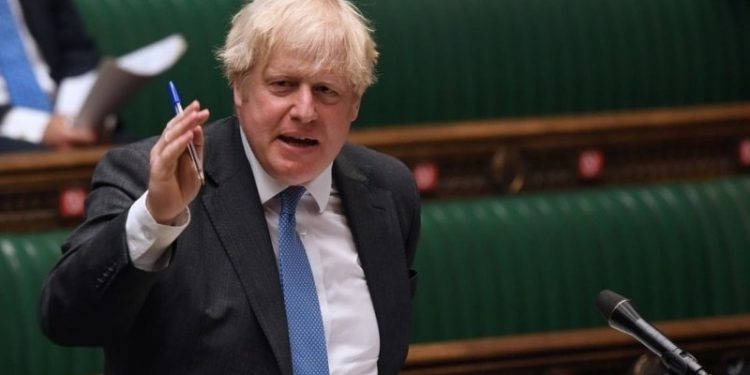London: UK Prime Minister Boris Johnson, who is currently on a visit to New Delhi, will face an investigation by a House of Commons committee into whether he misled Parliament on violating Covid-19 laws by having or attending parties at his 10 Downing Street office-cum-residence.
After a five hour debate on Thursday, the Commons, which corresponds to the Lok Sabha, voted unanimously on the opposition Labour Party’s motion to refer the matter to the Privileges Committee, with ruling Conservative Party MPs either voting in favour or abstaining.
Steve Baker, a hard-line Brexiteer and hitherto a staunch supporter of Johnson, joined the ranks of “Ayes”. “The Prime Mnister should have long gone,” he said in his speech.
Addressing the chamber, Labour leader Keir Starmer stated: “He (Johnson) has stood at that despatch box and point blank denied rule-breaking took place, when it did.”
He had earlier asserted: “Ministers who knowingly mislead Parliament will be expected to offer their resignation.”
Asked on TV for a reaction, Johnson, speaking from India, claimed he had “absolutely nothing, frankly, to hide”.
But even his ardent supporter, The Daily Telegraph newspaper, could not help but write: “Boris Johnson has been embroiled in controversy on the first morning of his long-awaited diplomatic visit to India after inaugurating a new JCB factory, one day after the company’s machines were used to illegally bulldoze Muslim homes and businesses in Delhi.”
JCB’s owner Anthony Bamford is close to Johnson, backed his leadership bid in 2019 and has donated an estimated 14 million pounds to the Conservative Party over the past 20 years.
The Privileges Committee examines accusations of contempt of Parliament by MPs. Misleading the House falls under its purview. It is made up of seven MPs � two Labour, one Scottish National Party and four Conservative. Its findings come back to the House for a vote.
However, the committee’s chairman, Labour’s Chris Bryant, has recused himself from the inquiry because he had already commented on the matter publicly. So, it will now be headed by Conservative vice-chair Bernard Jenkin.
The Committe will commence work only after the Metropolitan Police’s work has concluded.
On Wednesday, the Conservative Party had proposed an amendment to the motion to delay the vote. But fearing a massive backlash in upcoming local elections, the party withdrew it on Thursday morning.
Last week, London’s Metropolitan Police found Johnson guilty of being at a gathering to celebrate his birthday and fined him for this. He promptly paid the penalty and on Tuesday grovelingly apologised to the House.
Before he did so, though, historian Peter Hennessy described him as “a rogue Prime Minister”, who had “broken the law, misled parliament, and has in effect shredded the Ministerial Code”.
It’s widely speculated that the Met might find him guilty on two more counts; and the unabridged report by a senior civil servant into the ‘Partygate’ affair, which prompted the police probe, so far held back, could be severely damning. If these were not enough, there is the matter of nationwide local elections, which opinion polls indicate are likely to be a drubbing for the Conservatives, thereby convincing his fellow MPs that far from being a winner, Johnson is now become a liability.
For five months, Johnson has brazened out an avalanche of allegations against him over the scandal of parties at Downing Street during the pandemic. Two months ago, when it appeared that his party MPs were on the verge of asking for a confidence vote on him, he was saved by the diversion of Russia’s invasion of Ukraine.
On Wednesday, he began playing up his imminent visit to India. He told the Commons he will be travelling to India “to deepen the strategic trade, defence and people-to-people ties between our two countries”.
If the timing of the India trip was another attempt at distracting attention from the charges heaped on him, it has spectacularly misfired.
Upon landing in Gujarat, he claimed an Anglo-Indian “free trade agreement” would be signed and sealed by the autumn. This, too, is seen in informed British circles as misleading, as what could at best be achieved is “a limited trade pact”.
The heading of an opinion piece in Britain’s leading business daily Financial Times on Wednesday was: “Rhetoric is far ahead of reality when it comes to UK-India ties.”






































